|
|
|
Sort Order |
|
|
|
Items / Page
|
|
|
|
|
|
|
| Srl | Item |
| 1 |
ID:
105420


|
|
|
| 2 |
ID:
132540
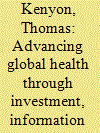

|
|
|
|
|
| Publication |
2014.
|
| Summary/Abstract |
The past decade has witnessed unprecedented levels of investment and engagement in global health spurred by the global HIV/AIDS crisis, the development of the Millennium Development Goals, momentum in polio eradication, and global outbreaks of infectious diseases such as SARS with its US$40 billion cost to society. Characterized by a sense of urgency, pragmatism, and opportunity, global health services and public health systems are being advanced to respond to rapidly expanding demands with dramatic results. However, much more remains to be done. After a decade in emergency mode, the next phase of global health work requires an even more precise approach and smarter investments. Many "donor" nations and organizations have tightened their belts in response to the recent economic downturn, while at the same time increasing the numbers of "recipient" countries, and are now better able to invest more of their own resources to benefit and protect their own citizens. In this climate, global health investments in programs and innovations must be better targeted and better informed by strategic information more than four-fold from US $6.7 billion in 1993 to US $28.4 billion in 2011. Accompanying this investment was a striking decline in mortality in children under five years of age from 12.6 million deaths in 1990 to 6.6 deaths million in 2012. Improvements in health are not the only positive outcome of these investments. The same Commission concluded that global health is a smart investment - for every dollar invested in health, it can be expected that there will be a 10-20 fold return in economic benefit to society. Healthier people are more productive and contribute back to the economy. Healthier people also lower health care costs, naturally, by requiring less care.
|
|
|
|
|
|
|
|
|
|
|
|
|
|
|
|
| 3 |
ID:
132541
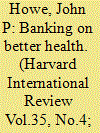

|
|
|
|
|
| Publication |
2014.
|
| Summary/Abstract |
HIV is no longer a death sentence" - that hopeful declaration-which would have been unthinkable even a decade ago- has now become a cliché by repetition whenever experts, physicians, academics and journalists gather to chart progress in fighting the disease and to set goals for the future. But for many people, sadly, that statement is not actually true. There remains no cure for the disease, and not everyone can get access to the anti-retrovirals (ARVs) that have done so much to help so many. This reflects the painful truth that poverty remains a major impediment to good health in the developing and even the developed world.
|
|
|
|
|
|
|
|
|
|
|
|
|
|
|
|
| 4 |
ID:
126257


|
|
|
|
|
| Publication |
2012.
|
| Summary/Abstract |
Biosecurity measures are traditionally applied to laboratories, but they may also be usefully applied in highly specialized clinical settings, such as the isolation facilities for the management of patients with highly infectious diseases (eg, viral hemorrhagic fevers, SARS, smallpox, potentially severe pandemic flu, and MDR- and XDR-tuberculosis). In 2009 the European Network for Highly Infectious Diseases conducted a survey in 48 isolation facilities in 16 European countries to determine biosecurity measures for access control to the facility. Security personnel are present in 39 facilities (81%). In 35 facilities (73%), entrance to the isolation area is restricted; control methods include electronic keys, a PIN system, closed-circuit TV, and guards at the doors. In 25 facilities (52%), identification and registration of all staff entering and exiting the isolation area are required. Access control is used in most surveyed centers, but specific lacks exist in some facilities. Further data are needed to assess other biosecurity aspects, such as the security measures during the transportation of potentially contaminated materials and measures to address the risk of an "insider attack."
|
|
|
|
|
|
|
|
|
|
|
|
|
|
|
|
| 5 |
ID:
076965
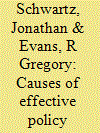

|
|
|
|
|
| Publication |
2007.
|
| Summary/Abstract |
This paper studies China's response to the Severe Acute Respiratory Syndrome (SARS) epidemic in 2003. It first assesses the current nature, structure and development of the Chinese infectious disease system, and then evaluates the state response to infectious disease epidemics. Turning to the role of non-state actors, it discusses their contributions to the state's efforts. Following a case study of Shaanxi province, it concludes that the SARS outbreak reveals the state's capacity to re-centralize power in the face of high-priority events. However, it also concludes that this government capacity alone, while necessary, is not sufficient to overcome SARS.
|
|
|
|
|
|
|
|
|
|
|
|
|
|
|
|
| 6 |
ID:
050862
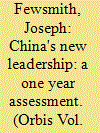

|
|
|
| 7 |
ID:
086691
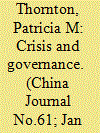

|
|
|
|
|
| Publication |
2009.
|
| Summary/Abstract |
How crisis-prone is the reform-era Chinese state? Whereas some have characterized it as a regime suffering from a hidden crisis of governance, or instead as one that has responded effectively to critical challenges by redesigning its core institutions, this article examines the political utility of crisis as a mobilizational tool from the Mao era to the present. Using the SARS outbreak of 2003 as a case study, I seek to demonstrate that, in fact, the rhetoric of crisis can help to legitimate extraordinary interventions by social and political elites, subvert the standard bureaucratic procedures that characterize normal politics and create political space for extraordinary mobilizations of resources to overcome challenges. The continuing deployment of crisis rhetoric by the Hu-Wen leadership can thus be read as one legacy of the mobilizational dynamics of the Mao-era state.
|
|
|
|
|
|
|
|
|
|
|
|
|
|
|
|
| 8 |
ID:
173726


|
|
|
|
|
| Summary/Abstract |
China faced the arrival of COVID-19 armed with new infrastructure, tools, and personnel that it had developed as part of a nationwide overhaul of its public health system in the wake of the 2003 SARS epidemic. The country learned two major lessons from SARS: it needed to increase its scientific professionalism and transparency, and it needed to build upon the successes of its authoritarian disease control capabilities. These two lessons were on full display during China’s COVID-19 response. The goals and methods they implied were sometimes in contradiction with each other, however, and ultimately they failed to prevent a catastrophic pandemic.
|
|
|
|
|
|
|
|
|
|
|
|
|
|
|
|
| 9 |
ID:
078026


|
|
|
| 10 |
ID:
062452


|
|
|
|
|
| Publication |
Jul-Aug 2005.
|
| Summary/Abstract |
Recent outbreaks of avian flu, SARS, the Ebola virus, and mad cow disease wreaked havoc on global trade and transport. They also all originated in animals. Humanity today is acutely vulnerable to diseases that start off in other species, yet our health care remains dangerously blinkered. It is time for a new, global approach.
|
|
|
|
|
|
|
|
|
|
|
|
|
|
|
|
| 11 |
ID:
066903
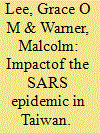

|
|
|
| 12 |
ID:
076678
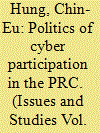

|
|
|
| 13 |
ID:
070706
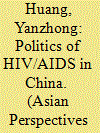

|
|
|
|
|
| Publication |
2006.
|
| Summary/Abstract |
This article provides a political analysis of the sequence and substance of China's policy response toward HIV/AIDS. Using an analytical framework that integrates historical institutionalism with policy process, the article examines how political institutions interacted with three policy streams (problem identification, policy generation, and elite politics) to delay an effective Chinese government response to the HIV/AIDS epidemic. It also demonstrates how the political, problem, and policy streams joined in the 2003 SARS crisis to prompt the government to take decisive action on HIV/AIDS.
|
|
|
|
|
|
|
|
|
|
|
|
|
|
|
|
| 14 |
ID:
182435


|
|
|
|
|
| Summary/Abstract |
Few days after Nigeria attained the sexagenarian status on October 1, 2020, the country has once again become a subject of unusual discourse both home and abroad. This is due to the protests by disgruntled youths against the activities of the Special Anti-Robbery Squad; a unit of the Nigeria Police Force, which has been accused of brutality, human rights violation, sexual abuse, torture, and extrajudicial killings among others. This study adopts a qualitative approach which draws data from reports of reputable international organisations, juried scholarly articles, working papers, and newspaper articles. The study concludes that the police adopts brutality, abuse, and violations as its tactics due to its inadequate equipment for investigation which makes officers deploy torture as a means of extracting the truth. This is further complicated by an ingrained culture of corruption, inadequate funding, political interference, inadequate personnel, and a pro-elite orientation. As a result, it is recommended that a sincere and comprehensive reform of the police be carried out to improve the welfare of the police; encourage the use of extensive technology, and improve police-community relations.
|
|
|
|
|
|
|
|
|
|
|
|
|
|
|
|
| 15 |
ID:
056275
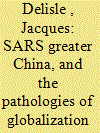

|
|
|
| 16 |
ID:
064657
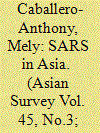

|
|
|
|
|
| Publication |
May-Jun 2005.
|
|
|
|
|
|
|
|
|
|
|
|
|
|
|
|
| 17 |
ID:
079927
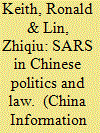

|
|
|
|
|
| Publication |
2007.
|
| Summary/Abstract |
This article surveys the Chinese response to SARS in law and politics. Over the course of the spread of SARS the party-state qualified legal reform strategy that was designed to provide new human rights protection and to curtail the state's arbitrary resort to policy and regulation without the benefit of law. This immediate response revealed the underlying problems of rule-of-law making, but the experience of SARS later informed the creation of new and improved law on infectious disease that reiterated the original assumptions of legal reform within a newly developing approach to the public management of health crises.
|
|
|
|
|
|
|
|
|
|
|
|
|
|
|
|
| 18 |
ID:
069941
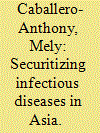

|
|
|
| 19 |
ID:
187448
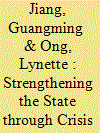

|
|
|
|
|
| Summary/Abstract |
How do state leaders use crisis management to strengthen state infrastructural power? What explains the strategic choices of a state’s selective institutionalization of crisis measures? Crises offer unique opportunities for state-building, yet the role of crisis management in consolidating state power is underexamined. This paper explores these important issues by examining how the Chinese government has deployed wartime-like measures in battling the spread of Severe Acute Respiratory Syndrome (SARS) and COVID-19. While authorities in China have adopted unconventional measures in managing the crises, they have selectively normalized ad hoc practices and institutionalized certain measures to strengthen state infrastructural power once they have ended or been temporarily contained. Drawing on the frameworks of rational choice and historical institutionalism, our analysis suggests that the central government normalizes or institutionalizes measures that help to consolidate its control of the bureaucracy and enhance regime legitimacy.
|
|
|
|
|
|
|
|
|
|
|
|
|
|
|
|
| 20 |
ID:
095191
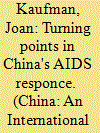

|
|
|
|
|
| Publication |
2010.
|
| Summary/Abstract |
China's AIDS response has evolved from one of denial and inaction to an aggressive and humanitarian policy based on international best practices. This article analyzes the events both internal and external that led to the policy shifts, highlighting key turning points in attitudes and action. A combination of domestic advocacy, international pressure, changing epidemic dynamics and fall-out from the SARS epidemic coaxed the government to greater transparency and deliberate action on prevention and treatment. However, a number of important challenges remain which will influence the ultimate success of China's much improved AIDS response.
|
|
|
|
|
|
|
|
|
|
|
|
|
|
|
|
|
|
|
|
|